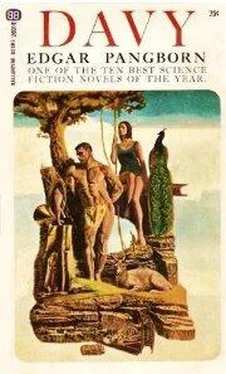But men can manage their business in the southern part of the breeding grounds, and luckily for men, the seal apparently never learn. Greatly daring, the slow outriggers specially built for the task pull out of Seal Harbor late in March and creep down the Lorenta Sea hugging its dangerous northern coast, past the island still named Anticosti and through a strait the sailors nowadays call Belly Wheel. That was once Belle Isle and meant Beautiful Island, but if you tell a modern sealer so, he’ll stare you down with the blubber-faced incomprehension of one of the poor beasts who make his living for him; if it annoys him enough, he may charge.
After passing through Belly Wheel they follow the coast northwest. It’s tricky work I suppose: they don’t dare either to let the cruel land out of sight or to drift too close and risk being caught in the tideways and currents and flung against it. They arrive at the breeding grounds with the winds of the great sea on their necks, and go ashore in small boats to do their butchery in haste, with clubs. They take only the blubber, and the best hides of the baby and yearling seal, leaving all carcasses where they lie to be dealt with by the vultures or swept away in high tide for the swarming sharks. If the voyage were not so tough for those clumsy vessels, and if men were more numerous, less superstitious and a little more brave, the seal would be extinct by now in spite of their massive numbers. The sealers have no least thought of husbandry or mercy, only of the quick dollar. All they can do is kill and kill and go on killing till the fat hulls of the cargo vessels are replete. This they do so that we may have light in the evening.
The untreated blubber is brought back in that state to Seal Harbor. I’ve heard that the townfolk know when the returning fleet has come within ten miles, from the rancid stink that heralds it even if there’s no east wind blowing. It’s a cause for rejoicing — after all it happens only once a year. Then comes a few weeks of work, after which the good citizens of Seal Harbor go back to the longer holiday of loafing, hunting, whoring, fishing, brawling — above all brawling — and picking each other’s pockets until the next year’s “fat weeks.” During the trying and for days afterward unless a merciful wind arrives, the smoke from the blubber-works lays a black-purple cloud over the shabby city, and even hardened long-time inhabitants are sick. That’s one of the main reasons why it is a city of scum, misfits, criminals, failures. No one wants to live there who could earn a living and be welcome somewhere else.
We journeyed north by rather slow stages in the closing days of 317, often spending more than a week in a village if we enjoyed the style of it. Pa Rumley’s way was leisurely; I’ve heard him remark that if a thing wasn’t still there by the time you arrived it likely wouldn’t have been worth hurrying after. Not many Rambler gangs head north when winter’s advancing: as we drifted along the Lowland Road, always with the grave splendor of the mountains at the right hand, the villages were happy to see us and bought well, being somewhat starved for entertainment and news. At a good-sized town named Sanasint we turned east, crossing over the border into the north end of Vairmant. We spent the winter months of December through March in a way most Rambler gangs wouldn’t have cared to do, at a lonely camp of our own devising in a pocket of the Vairmant hills. May, Pa explained, was the time to hit Seal Harbor, when the oil buyers had come and gone, and the companies had paid off the workmen but there hadn’t been time for all the money to settle into the pockets of a few gamblers and crooks; but that wasn’t his main reason for holing up during the winter. He did that for about three months of every year — nay, we did it down in Penn too where there’s hardly such a thing as winter — so that the grown-ups could loaf and mend harness while the young stuff, by Jesus and Abraham, would please to settle down and learn something. Two things, Pa said, were capable of taking some of the devil out of the young — birch and learning. Of the two, learning was best, in his opinion, even if it did smart considerably more.
Mam Laura concurred. Gentle and gently philosophic at most other times, capable of sitting in the same position for an hour doing nothing but smoke her pipe and gaze at the landscape, Mam Laura became a demon of energy in the presence of a student who showed some inclination to learn a little. Anything went then — snarling invective, language that would have made my Da blush (sometimes did), sarcasm, intense but thoughtful praise, a slap on the cheek — anything, all the way up to a kiss or one of the honey-and-walnut candies that she kept secretly in her own compartment and that no one else knew how to make. Anything went, so long as she could hope it would help to fix a bit of truth in your mind where with luck you might not lose it.
She was born in Vairmant, south of the tranquil wilderness spot where we made our winter quarters that year. The name of her birth town was Lamoy, a hill town close to the Levannon border. Later, when we were journeying down through that part of the nation, we avoided the turnoff for Lamoy although it was a prosperous place and we might have done well there. Mam Laura had nothing against it, but she had made a complete break with childhood long ago and had no wish to attempt revisiting the past. She was the daughter of a schoolmaster; I could hardly hold my amazement when I learned that in Vairmant, though the Holy Murcan Church controls the schools of course, the teachers are not necessarily all priests. Mam Laura’s father was secular, a scholar and visionary, who privately gave her an education far beyond anything he was allowed to impart to the other children of his school: he had a quackpot theory that within her lifetime it might be possible for a woman not a nun to be permitted to teach — a weird thought for which he could have been booted out of the school and into the pillory. In her darker moods Mam Laura sometimes said that he was fortunate because he died rather young. In such moods also, she sometimes felt that his teaching and encouragement had merely unfitted her for any world except the one that existed only in his mind.
I didn’t always understand, in the days when I was struggling to win my way into the region of knowledge she opened up for me, how completely a giver Mam Laura was — well, what child ever does grasp the motives behind a teacher’s thankless labors, or for that matter the value of the teaching itself? I dare say a child with that much insight would be a sort of monster. But now, when Nickie’s twenty-nmth birthday and mine are behind us, it seems to me I do begin to understand Mam Laura and her teaching — now, when we are so much concerned for the child Niche is carrying, so full of thoughts for the child’s future and so uncertain what manner of world that child will be driven to explore.
* * *
This is late April on the island Neonarcheos. Lately I have written only sporadically, often unwillingly, angry at a compulsion that can drive an otherwise reasonably intelligent man both toward and away from the pen — ah, who but a fantastic quackpot would ever write a book? Likely you noticed how my method of storytelling altered, a while back. That was partly because my mind is frightened and distracted — Nickie is not well.
She insists her daily and nightly pain and discomfort are entirely natural for the seventh month of pregnancy. The perils of that stately condition are vastly exaggerated, she says — she’s never lost a husband from it yet. The child lives and moves, we know; often she wants me to feel “him” kick.
But there is another genuine reason why I’m writing about my time with the Ramblers in what may appear to you a more hasty style — no detailed story now, merely a touching of what I best remember. I have no inclination to apologize. Your own worst fault, you know, is just the opposite of haste: I mean this dreadful mewling uncertainty, this messing about never quite able to make up your mind whether you exist; you ought to overcome it if it’s within your power. No apology, but a moderate effort at explanation.
Читать дальше












